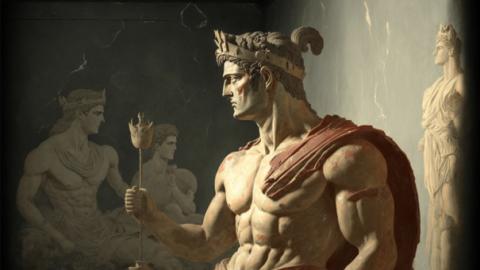The Hero: the metaphysics of unhappiness
Primary tabs

If we get rid of the celestial dimension, then we have a human. If we get rid of the earthly dimension, then we have God. But it is in the hero that we have the intersection of earth and sky.
At first there is simply the human (some earthly being), then there is the Greek, then there is God. This is to say that the Greek is the path to the hero (Greek civilization is the heroic civilization) and that the hero is the human’s path to God. Thus it was for Homer and all the way up to the Neoplatonists, and then with certain changes in Christianity.
The hero is the path of God to the human, and of the human to God. Through the hero, God can know what is uncharacteristic of himself, for instance suffering. Hence the notion that heroes’ souls are the tears of gods. Because God is dispassionate, serene, eternal, and nothing bothers him, whereas man is passionate, in pain, suffers, is tormented, experiences destitution, humiliation, weakness, and doubts. God will never know passion, pain, and loss, and he will not come to know the essence of man without having his own heroic son or daughter who allow God to experience the nightmare, horror, and depths of destitution and deprivation inherent to the human being. God is not interested in prosperous and successful people, and their achievements are nothing compared to His self.
And yet, man, suffering, tormented, struggling with fate, is an enigma to God.
And yet, God might want to transcend Himself, his own dispassion, his own bliss, and to taste destitution — that is to transcend the absence of bliss to experience suffering (πάθος in Greek) and affliction. It is the hero who allows God to feel pain and allows the human being to discover the experience of bliss, greatness, immortality, and glory.
Heroism, thus, is an ontological and simultaneously anthropological instance, a vertical along which the dialogue of the divine and the human (or the heavenly and the earthly) takes place.
But wherever there is a hero, there is always tragedy. The hero bears within themself suffering, pain, rupture, and tragedy. There is no such thing as happy, fortunate heroes, for all heroes are necessarily unhappy and unfortunate. The hero is unhappy misfortune.
Why? Because to be at once eternal and temporal, dispassionate and suffering, heavenly and earthly, is the most unbearable experience for any being whatsoever, a condition which you wouldn’t wish upon your enemy.
In Christianity, the place of the heroes was taken by ascetics, martyrs, and saints. Likewise, there are no happy monks or happy saints. They are all humanly, deeply unfortunate. However, according to a different, heavenly account, they are blessed. As blessed, they are the mourning, the persecuted, those who suffer slander, those who are hungry and thirsty in the Sermon on the Mountf. They are the unfortunate blessed.
A human is made into a hero by a thought that aspires toward the sky but falls back unto earth. A human is made into a hero by the suffering and misfortune that always tear them apart, torment, torture, and temper them. This might happen in war or in the excruciating death of a martyr, but just as well without war and without death.
The hero seeks out their own war for themself, and if they do not find it, they’ll make way for a cell, head to join hermits and fight with their own real enemy there. For true struggle is spiritual struggle. Arthur Rimbaud wrote of this in his “Illuminations”: “Le combat spirituel est aussi brutal que la bataille d’hommes.” He knew what he was talking about.
As the Neoplatonist Proclus said, one hero is equal to a hundred or even thousands of ordinary souls. The hero is greater than the human soul, because they compel every soul to live vertically. This is the heroic dimension behind the origins of theater and, in essence, the ethics of our faith — this is the foremost which we must not lose, which we should cherish in others and nurture in ourselves.
Our task is to deeply, fundamentally, and irrevocably become unfortunate. As frightful as that might sound. Only in this way can we attain salvation.
Translation by Jafe Arnold
